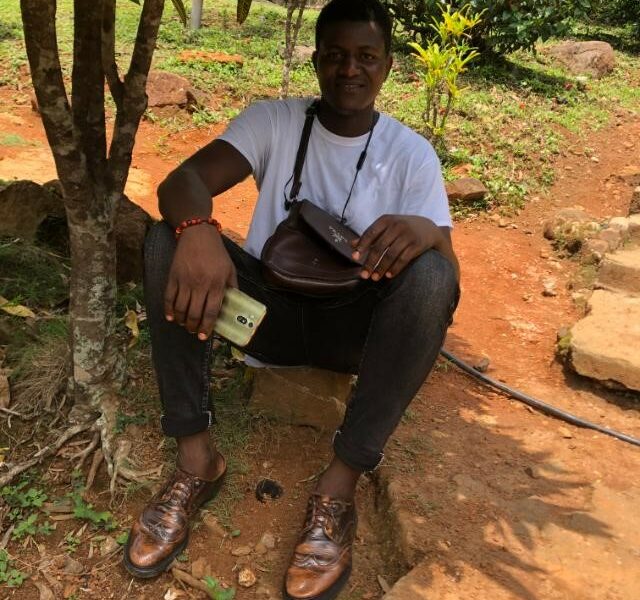Sierra Leone at 35th AFSAAP Conference
The 35th Annual African Studies Association of Australasia and the Pacific (AFSAAP) post graduate conference has just ended at Burgmann College, Australian National University campus, Canberra, graced by students, academics, researchers, practitioners, and policy makers with interests in African studies both from Africa and the Australasia & Pacific region. (Photo: Ibrahim Ahmad Kargbo, Murdoch University, Australia)
In total there were 70 presentations, 44 presentations at the main conference and 26 at the postgraduate session held from the 26th to 29th November, 2012, with the theme “Africa: People, Places and Spaces”. Thematic areas covers a wide spectrum; Post-Conflict, Africa-Australia Identity , Pre-& Post-Colonial Legacies, Sudan Crisis & Promise, Law & Society, society & mobility, media & identity, economy & agriculture, Africa & education, Geographies of Education & Literature, Resources, Accountability & Governance, Land Use & Land Rights, Gender & Discrimination, Governance in Sub Saharan Africa, Education in Uganda & South Africa, Responses to Resource Management, Health & Development.
Laterally presented for 20 minutes each, followed by questions and clarifications, the conference marks a turning point following its first President Professor Anthony Low delivering his last public lecture significantly pinned on the rapid running down of African universities, Makarere & Fourah Bay College highlighted.
The AFSAAP 2012 Key Note Speaker Professor Tony Binns is President of the New Zealand Geographical Society whose research was carried out in Sierra Leone in the 1970’s; he lauded AFSAAP for the honour as he exhibits his enterprising academic journey defined by his motivational interest in Sierra Leone’s geography, people, politics, places and current status of the re-election precipitating prospects for development.
Three other presentations graced the conference about Sierra Leone; the main issues explored by Mr. Ibrahim Ahmad Kargbo are institutionalizing participation in political decentralization using Sierra Leone as example; concrete reasons why strategic public participation guarantees effective service delivery resulting to development, building capacity to match changing roles and responsibilities.
Two from the three “Governance in Sub-Sahara Africa” presentations were surprisingly on Sierra Leone. Lorraine Bowan lived and teach in Prince of Wales in Freetown, resided in Shell New Road and had observed and undertaken a casual secondary research of the justice system in Sierra Leone, specifically the right to speedy trials which is negated by long overdue unexplained detentions without trial. Her presentation queries that as an abuse to legal procedures using the matter between Omrie Golley & the state in 2006/2007. She believes the 1978 one-party legal legacy is still having a strong influence on the Sierra Leone judiciary. Mr. Kargbo in observing concede to the apparent inefficiency of the Sierra Leone judicial system being part of a public service that is still undergoing reform following decades of contamination by politics, patronage and ineptitude; he adds that a Justice Sector Reform Strategy & Investment Plan is helping out in this direction, augmenting attraction for young lawyers to opt for Magistrate positions to make up for the deceit leading to the delay in trials, while a Legal Aid Scheme launched under the same project is helping the poor & marginalized to be represented. Reforming prison conditions resulting from congestion noted by Lorraine is also part of the project, Mr. Kargbo observed.
George N. Rublee is a visiting Fellow in the School of Politics & International Relations at ANU also carrying his PHD research on the normative features influencing political culture in Sierra Leone. He presented a historical evolution from pre, during, post colonization to present including the just concluded elections. Rublee note the over centralization of governance throughout historical Sierra Leone and corruption having the propensity to kill the fabric of economic development.
From 1978-1980 Emeritus professor Anthony Low former ANU Vice Chancellor served as AFSAAP’s first president and in delivering his last public lecture on the 28th he recall the 1950’s when he was requested to train African leaders at Makarere which had been established decades ago as a technical institute, until his arrival, gaining university accreditation in 1951. Various distinguished East and Southern African leaders in post-colonial period passed through Prof Low, he express disappointment in the quick run-down of carefully built tertiary institutions. Australian policy-maker view at the conference the argue the major factors responsible are African leaders not sending their kids to study in home universities and governments directing less investment in the education sector.
FBC was noted to have been the Athens of West Africa, Prof David Lucas has been there once in the 1980’s and vividly recall the falling standards, while Lorraine was present when students exams were disturbed for lack of writing booklets and Mr. Kargbo note the lack of research capacity by the institution in addition to its physical challenges.
Dr. Tanya Lyons, current AFSAAP president expanding on the policy-maker point of view informs that a new Australian African University Network (AAUN) has been launched attracting interest to many Australian universities to participate. Once they acknowledge the responsibility to support, the network encourages expression of interest from failing African universities to be a part; it aims to achieve development of African universities through MOU’s between FBC and ANU or Flinders for instance that will see staff exchange and support to research. By copy staff of FBC reading this article are encouraged to follow the footsteps of the University of Limpopo in South Africa (founded in 1959) which is one of the recent members joining the network.
Dinner at Ferkerte’s Ethiopian restaurant, Pro Binni cracking familiar jokes on Sierra Leone and its climate, people and culture climaxed the 35th 2012 AFSAAP conference.
Ibrahim Ahmad Kargbo, Murdoch University, Australia
Stay with Sierra Express Media, for your trusted place in news!
© 2012, https:. All rights reserved.




